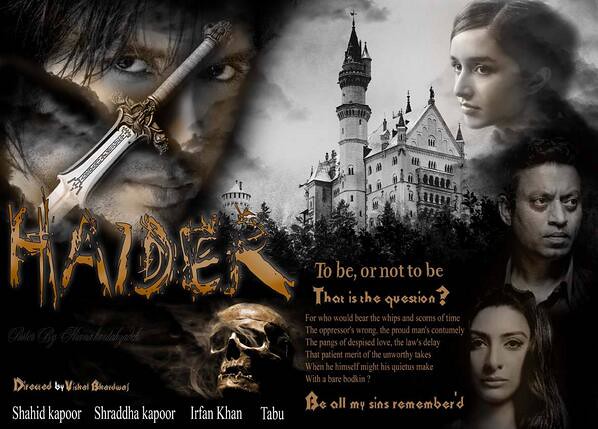50 shades of Kashmir: Hamlet goes to Bollywood
Kashmir is a half-widow. A valley that is neither mountain nor plain. A state where some think it is a nation. A language torn between lilting folk accents and the pretentious grammar of an official tongue that is not quite its own. A liberal culture steeped in Shaivism and Sufism interrupted by harsh, imported militant ideas.
Dilemma is a natural state here: To be or not to be. Main hoon, ya main nahin?
And what better metaphor for this than Hamlet? Or his mother in her myriad layers of affections, anger and despair? Or his angelic sweetheart, torn between father, brother and lover?
It was in the autumn of 1947 that Indian troops rushed to Kashmir to defend its women and citizens from marauding invaders sent from Pakistan. The lost irony in this is that the supreme commander of the Indian armed forces then was Governor General Mountbatten, who imposed on Nehru – and on history – the painful idea of a plebiscite to determine the political future of Jammu and Kashmir. The scars have not healed. The minds, primed like Hamletian Haider, still grope in confusion.
It takes a Vishal Bharadwaj to take a quintessentially English character from Britain’s biggest literary icon, Shakespeare and serve Kashmir’s grey shades in the overcast landscape of a harsh winter, with its alluring snows and leafless trees seeking deliverance from the army gumboots that stamp on its chequered British-influenced history.
Haider is a poet, vulnerable and mother-obsessed yet nurtured by a father whose call of duty as a doctor lands him in the crossfire of army and militants. In this atmosphere of rustic homes, houseboats, narrow streets and characters led by a mix of survival, ambition and confusions, betrayal is a natural leitmotif – real or imagined.
Revenge is a natural corollary.
It takes creative gumption, and significant artistry, to tell this macabre tragedy with its own black humour and Bollywoodesque colours. Bharadwaj seems to draw liberally from Shakespeare’s own humour (sadly, I haven’t read the original or watched Hamlet) and give it a post-modern feel.
There is a shaadi-dance opera to turn a family tale into a political metaphor and a pair of Salman Khan fans to provide comic relief bundled with cloak-and-dagger espionage.
But beyond all this, Haider an attempt to look at the Kashmir from criss-cross narratives that become prisms refracting rays of truths we may never know in full. Haider takes a multi-prismatic view of Kashmir: humanism, documentary, gender, philosophy, art, politics and above all – motherhood.
Shahid Kapoor manages to portray, presumably under Bharadwaj’s tutelage, the role of a lifetime. But it is the overall casting that brings an authentic flavour. Tabu as a volatile mother, Kay Kay as a grey-shaded uncle torn between petty ambition and street-quality romance, Narendra Jha as Dr. Hilal Meer, Haider’s physician father and Irrfan Khan as a latter-day father’s ghost in a special appearance.
Shraddha Kapoor, as a frail, angelic, caring Arshi is a director’s delight – just how much can one expect a fresh face to show depth and innocence while speaking in a demanding accent?
The music, with its eerie use of Kashmir’s stringed folk instruments, and the camera, with its penchant to capture the timeless but desolate beauty of a troubled valley, speak to the unconscious, enhancing the more visible metaphor of a vulnerable prince who can’t make up his mind.
Much will be said by those who insist on black-and-white portrayals of what is essentially a grey theme. The Indian army’s difficult stance, as also the historical nuances of its intervention in Kashmir, where it moved valiantly to protect its citizens, are presented accurately, and still tongues wag because the film also emphasizes the human difficulties of a zone under military surveillance.
When the tongues stop wagging, Bharadwaj can still congratulate himself for pulling off a Shakespearean hat-trick: Maqbool as Macbeth was a tentative but promising start. Omkara as Othello elevated it to an authentic formula. Haider as Hamlet takes it close to audacious perfection.
As the guns and graves echo a living tragedy, the characters hang heavy: like the afternoon mist in a half-widow valley, interrupted by hawks circling above and dew drops that fall like tears. Like the quiet gurgle of the Jhelum, the director’s message does manage to get in: The azaadi (freedom) you need is from the idea of inteqam (revenge).



Comments
Post a Comment